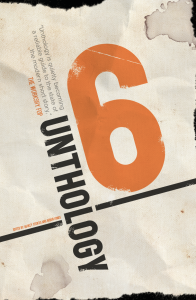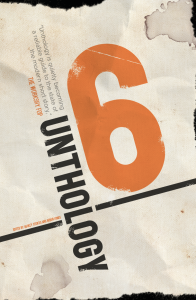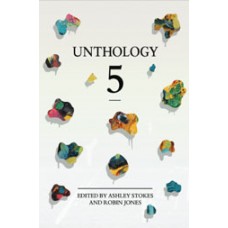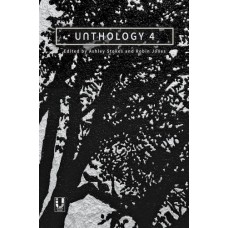Unthology #6 (ed. Ashley Stokes & Robin Jones)
-Reviewed by Charlotte Barnes–
Over recent years the Unthology collections, published by Unthank Books, have established themselves not only as a quality source of literary entertainment, but also as a beacon of promise for the short story genre. The collections, now published on a biannual basis, have frequently collected promising and flattering reviews, whilst reminding readers exactly how much detail and quality can be captured in just a few short pages. Unthology 6 continues this trend with a series of stories that, despite sometimes being worlds apart from each other, somehow blend together in a seamless manner, to such an extent that I devoured the entire collection at speed, enjoying one story after the next.
The editors of the collection use the Introduction to establish their hopes for this ongoing series. Referring to the collection as an all-you-can-eat, after reading the stories contained here I can happily confirm that Unthology 6 is indeed a literary banquet. An assessment that will, I hope, please the editors of this release.
Gordon Collins’s ‘Psycho-Nasal Aggravation Syndrome’ is a charming introduction to this publication. Collins quickly establishes a strong tone in the piece, reinforced, perhaps, by his first person narrative which carries the reader through a nasal-hair-related-conundrum that, whilst being troubling for the speaker, is undeniably amusing for those reading the tale. ‘The Story With Yuliya Has A Bad Ending’, by Alexandros Plasatis, was an intriguing read not only for content but also in terms of construction and tone, the latter of which is somewhat erratic but in a readable and appropriate way. This is a quality that appears again at a later point in the collection in Jonathan Pinnock’s unconventional tale, ‘Hay. Pee. Ah. Wrist.’ A fractured text that still somehow manages to make a significant impact.
‘Daughter, God Daughter’ by Chrissie Gittins was, for me, one of the more emotional pieces. Gittins creates an all-too-familiar scenario of visiting an elderly relative, transcribing conversations and arrangements that truly touched base with reality, offering a sentimental note to these earlier stories. In a number of ways, this emotion is carried through to Alisa Cox’s ‘Killing With Kindess’, although it becomes appropriately distorted in this troubling tale, before appearing again later in Simon Griffiths’s ‘Stalemate’, which is a personal favourite from the collection. The stubborn protagonist of this particular piece, Henry, is simultaneously endearing, frustrating, and entirely familiar. In addition, allowing for an injection of Turing trivia throughout the text, this is not only emotive but also extremely topical, and certainly a highlight in the book.
In the interest of highlighting personal favourites, it also seems worth referring to James Wall’s tragic tale, ‘Niagara Falls’, which is simply beautiful. This short piece revolves around reunited lovers who, having missed their chance the first time around, decide to rekindle their initial interest in each other. Wall captures the anxiety of love in a modern era throughout this tale, specifically in his references to social media that weight this story in an entirely real world. Using a well-written first person narrative, he remarks:
I searched for her status but there was nothing completed. It doesn’t mean anything, I told myself.
However, alongside this emotion there are also darker elements that are worth noting, Neil Campbell’s ‘Ceum Na Caillich’ being one example of this. During a hiking expedition we are introduced to the apparent disdain a woman feels towards her partner, who has lured her on one unwelcome adventure after another since their relationship began. The attitude portrayed here is not only utterly convincing, but also just dark enough to be relatable, demonstrating what a delicate balance Campbell has found here. The darker tone of this aforementioned text is again mirrored in Victoria Hattersley’s ‘The Girl’, which is an utterly chilling read! The ‘he’ of the text drip-feeds information about ‘she’, who he has apparently be observing during their train journeys for some time now, unbeknownst to the unidentified female. There is a voyeuristic tone captured here which is commendable, and ultimately this serves up a delicious ambiguity that leaves the reader to make a number of startling conclusions for themselves.
Additionally, between emotion and tension, of which there is plenty, there are also lighter moments that offer genuine humour and reprieve from the more serious texts. An example of this being ‘The Novel Factory’ by Luke Melia which not only sounds impressively authentic, but it is also an endearing story of a young man infatuated with a young woman. The story begins, ‘My humble apologies dear reader’, introducing an intimacy between reader and narrator that is carried throughout the text, and reinforced in the final paragraph where Melia writes, ‘My humble apologies once more for this interruption to your reading pleasure.’
Unthology 6 is an undeniably well-crafted collection of literary fiction that provides a smorgasbord of short stories. These texts collectively tick an impressive number of boxes in terms of what exactly they cater to, offering both amusement, empathy, familiarity, and surprise. Ultimately, this collection is a wonderful addition to the shelves of short story readers, and a promising publication for the short story genre itself.





